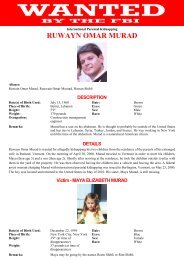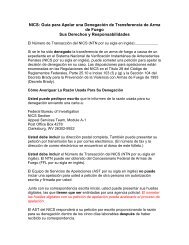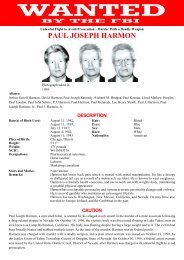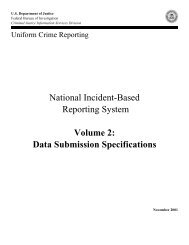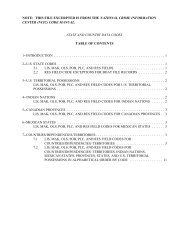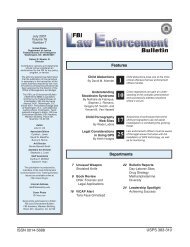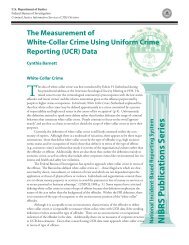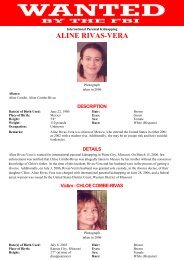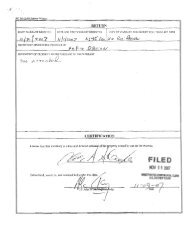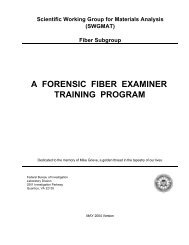F B I Law Enforcement Bulletin - June 2003 Issue
F B I Law Enforcement Bulletin - June 2003 Issue
F B I Law Enforcement Bulletin - June 2003 Issue
You also want an ePaper? Increase the reach of your titles
YUMPU automatically turns print PDFs into web optimized ePapers that Google loves.
To find out if you are a workaholic, rate yourself on each of the statements below, using a rating scale of 1 (never<br />
true), 2 (sometimes true), 3 (often true), or 4 (always true). Put the number that best describes your work habits in the<br />
blank beside each statement. After you have responded to all 25 statements, add up the numbers for your total score.<br />
The higher your score, the more likely that you are a workaholic, whereas the lower your score, the less likely that you<br />
are a workaholic.<br />
__ 1. I prefer to do most things myself, rather than ask for help.<br />
__ 2. I get impatient when I have to wait for someone else or when something takes too long.<br />
__ 3. I seem to be in a hurry and racing against the clock.<br />
__ 4. I get irritated when I am interrupted while I am in the middle of something.<br />
__ 5. I stay busy and keep many irons in the fire.<br />
__ 6. I find myself doing two or three things at one time, such as eating lunch, writing a memo,<br />
and talking on the telephone.<br />
__ 7. I overcommit myself by accepting more work than I can finish.<br />
__ 8. I feel guilty when I am not working on something.<br />
__ 9. It is more important that I see the concrete results of what I do.<br />
__ 10. I am more interested in the final result of my work than in the process.<br />
__ 11. Things just never seem to move fast enough or get done fast enough for me.<br />
__ 12. I lose my temper when things do not go my way or work out to suit me.<br />
__ 13. I ask the same question again, without realizing it, after I already have received the answer.<br />
__ 14. I spend a lot of time mentally planning and thinking about future events while tuning out<br />
the here and now.<br />
__ 15. I find myself continuing to work after my coworkers have stopped.<br />
__ 16. I get angry when people do not meet my standards of perfection.<br />
__ 17. I get upset when I am in situations where I cannot be in control.<br />
__ 18. I tend to put myself under pressure from self-imposed deadlines.<br />
__ 19. It is hard for me to relax when I am not working.<br />
__ 20. I spend more time working than socializing with friends or on hobbies or leisure activities.<br />
__ 21. I dive into projects to get a head start before all of the phases have been finalized.<br />
__ 22. I get upset with myself for making even the smallest mistake.<br />
__ 23. I put more thought, time, and energy into my work than I do into my relationships<br />
with loved ones and friends.<br />
__ 24. I forget, ignore, or minimize celebrations, such as birthdays, reunions, anniversaries, or holidays.<br />
__ 25. I make important decisions before I have all of the facts and a chance to think them through.<br />
For clinical use, scores on the test are divided into three ranges. Those scoring in the upper third (67-100) are<br />
considered highly workaholic. If you scored in this range, it could mean that you are on your way to burnout, and new<br />
research suggests that family members may be experiencing emotional repercussions as well. Those scoring in the<br />
middle range (57-66) are considered mildly workaholic. If you scored in this range, there is hope. With acceptance<br />
and modifications, you and your loved ones can prevent negative long-term effects. Those scoring in the lowest range<br />
(25-56) are considered not workaholic. If you scored in this range, you are probably an efficient worker instead of a<br />
workaholic and have no need to worry that your work style will negatively affect yourself or others.<br />
16 / FBI <strong>Law</strong> <strong>Enforcement</strong> <strong>Bulletin</strong><br />
Work-Addiction Risk Test<br />
Source: B.E. Robinson, Chained to the Desk (New York, NY: New York University Press, 1998), 52-54.<br />
Minor editorial revisions have been made to several test items.



